Unveiling the Top Cloud Contact Centers in 2025
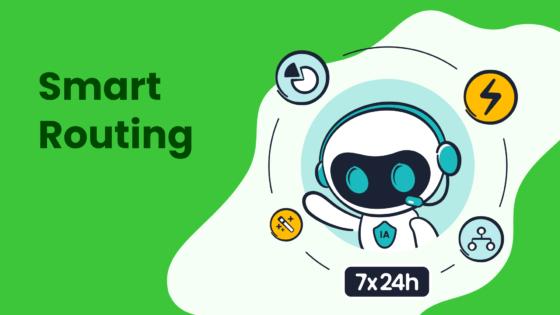
In 2025, cloud contact center solutions redefine how you connect with customers. These platforms help businesses identify recurring issues, personalize interactions, and optimize service channels. By leveraging advanced tools like AI-powered virtual assistants and intelligent call routing, you can empower customers to resolve issues independently while enhancing agent efficiency. Companies like Sobot lead this transformation by integrating cutting-edge features such as sentiment analysis and predictive scheduling. This approach improves workforce management and ensures seamless, tailored customer experiences, making it an essential strategy for modern businesses.
Understanding Cloud Contact Center Solutions
Definition and Importance
Cloud contact center solutions represent a modern approach to managing customer interactions. Unlike traditional systems, these solutions operate entirely on the cloud, enabling businesses to handle inquiries across multiple channels like voice, email, chat, and social media. Their importance lies in their ability to streamline operations, reduce costs, and enhance customer satisfaction. Metrics such as Average Resolution Time (ART) and Customer Satisfaction Score (CSAT) highlight their effectiveness in improving service quality.
| Metric | Description |
|---|---|
| Average Resolution Time (ART) | Measures the average time taken to resolve a customer issue, indicating efficiency and productivity. |
| First Response Time (FRT) | Indicates how quickly a support agent responds to a customer's inquiry, reflecting attentiveness. |
| First Contact Resolution (FCR) | Represents the percentage of cases resolved in the first interaction, indicating agent effectiveness. |
| Customer Satisfaction Score (CSAT) | Captures customer satisfaction levels post-interaction, providing insights into support quality. |
These metrics demonstrate how cloud contact center solutions help businesses deliver faster and more effective support, ensuring a positive customer experience.
Differences from Traditional Call Centers
Traditional call centers rely on on-premises infrastructure, limiting their scalability and flexibility. Cloud contact center solutions, on the other hand, offer unmatched adaptability. You can scale operations up or down based on demand without investing in additional hardware. These solutions also support omnichannel communication, allowing customers to reach you through their preferred platforms. While traditional systems often struggle with integration, cloud-based platforms seamlessly connect with CRM systems and other tools, ensuring a unified workspace for agents.
Key Functions and Benefits
Cloud contact center solutions provide several key functions that drive measurable benefits:
- Improvements in customer service: Businesses report higher customer satisfaction and agent productivity.
- Increased interaction channels: With an average of 6.31 channels, these solutions outperform on-premises systems, which offer only 4.71 channels.
- Lower operational costs: Annual costs per agent are significantly lower, with full CCaaS costing $1,905 compared to $2,104 for on-premises systems.
- Future-proofing capabilities: Nearly half of cloud users adopt AI technologies, compared to just 25% of on-premises users.
- Built-in flexibility: Even organizations favoring on-premises systems can innovate within cloud environments.
These benefits make cloud contact center solutions indispensable for businesses aiming to enhance customer experience while optimizing operational efficiency.
Why Cloud Contact Centers are Essential in 2025
AI Integration in Contact Centers
AI has revolutionized the way businesses manage customer interactions. By integrating AI into cloud contact centers, you can automate repetitive tasks, reduce costs, and improve efficiency. AI-powered tools like chatbots and virtual assistants handle routine inquiries, allowing agents to focus on complex issues. This shift not only enhances productivity but also reduces agent stress.
- AI deployments are projected to save businesses $80 billion in agent labor costs by 2026.
- One in ten customer interactions is expected to become automated, streamlining workflows.
- Companies using conversational AI report a 27% reduction in handle time and a 32% increase in team productivity.
These advancements lead to faster resolutions, better service quality, and improved customer experience. With AI, your contact center becomes a hub of innovation and efficiency.
Omnichannel Communication Benefits
Modern customers expect seamless communication across multiple platforms. Cloud contact centers excel in providing omnichannel solutions, enabling you to connect with customers through voice, email, chat, and social media. This approach ensures consistent service and builds trust.
| Metric | Value |
|---|---|
| Customer Retention Rate | 89% |
| Year-over-Year Increase in Retention | 91% |
| Digital Journeys Across Channels | 85% |
These numbers highlight the effectiveness of omnichannel communication in retaining customers and enhancing their journey. By unifying all channels, you can deliver a personalized and cohesive customer experience, fostering loyalty and satisfaction.
Scalability and Flexibility
Cloud contact centers offer unmatched scalability and flexibility, making them indispensable for businesses in 2025. Unlike traditional systems, they allow you to scale IT resources based on traffic volumes, ensuring optimal performance during peak times.
- The North American cloud-based contact center market is expected to reach $26.9 billion by 2029, growing at a CAGR of 23.9%.
- Cloud solutions enable remote work for agents, improving productivity and operational efficiency.
- Transitioning to cloud platforms reduces deployment time and enhances flexibility.
These features make cloud contact centers a future-proof solution, empowering businesses to adapt to changing demands while maintaining high service standards.
Enhanced Customer Experience with Analytics
Cloud contact centers empower you to deliver exceptional customer experiences by leveraging advanced analytics. These platforms analyze vast amounts of data to uncover actionable insights, enabling you to optimize service delivery and exceed customer expectations.
How Analytics Transform Customer Interactions
Analytics tools in cloud contact centers provide you with a deeper understanding of customer behavior and preferences. By monitoring call volumes and response times, you can identify bottlenecks and improve service efficiency. AI-generated transcripts highlight areas where agents can enhance their performance, ensuring continuous improvement.
- Real-time dashboards allow you to compare performance against SLAs and key metrics.
- Sentiment analysis identifies patterns in customer interactions, helping you prevent escalations.
- Surveys capture feedback, revealing trends and opportunities for service enhancement.
These capabilities enable you to address customer needs proactively, fostering trust and loyalty.
Personalization Through Data Integration
Cloud contact centers integrate data from multiple touchpoints, creating a cohesive view of the customer journey. This unified approach allows you to personalize interactions based on historical data and preferences. Machine learning algorithms analyze this information to suggest tailored solutions, ensuring every interaction feels meaningful.
Tip: Use AI-driven insights to anticipate customer needs and deliver faster resolutions.
Driving Efficiency with Predictive Analytics
Predictive analytics help you forecast customer demands and allocate resources effectively. By analyzing average handle times and agent performance, you can implement targeted training programs to boost productivity. Generative AI extracts insights from interactions, enabling faster issue resolution and reducing operational costs.
- AI tools identify intent and sentiment, ensuring agents address concerns effectively.
- Performance reports highlight areas for improvement, enhancing team efficiency.
With these tools, you can transform your contact center into a hub of innovation, delivering consistent and superior customer experiences.
Top Cloud Contact Center Solutions in 2025
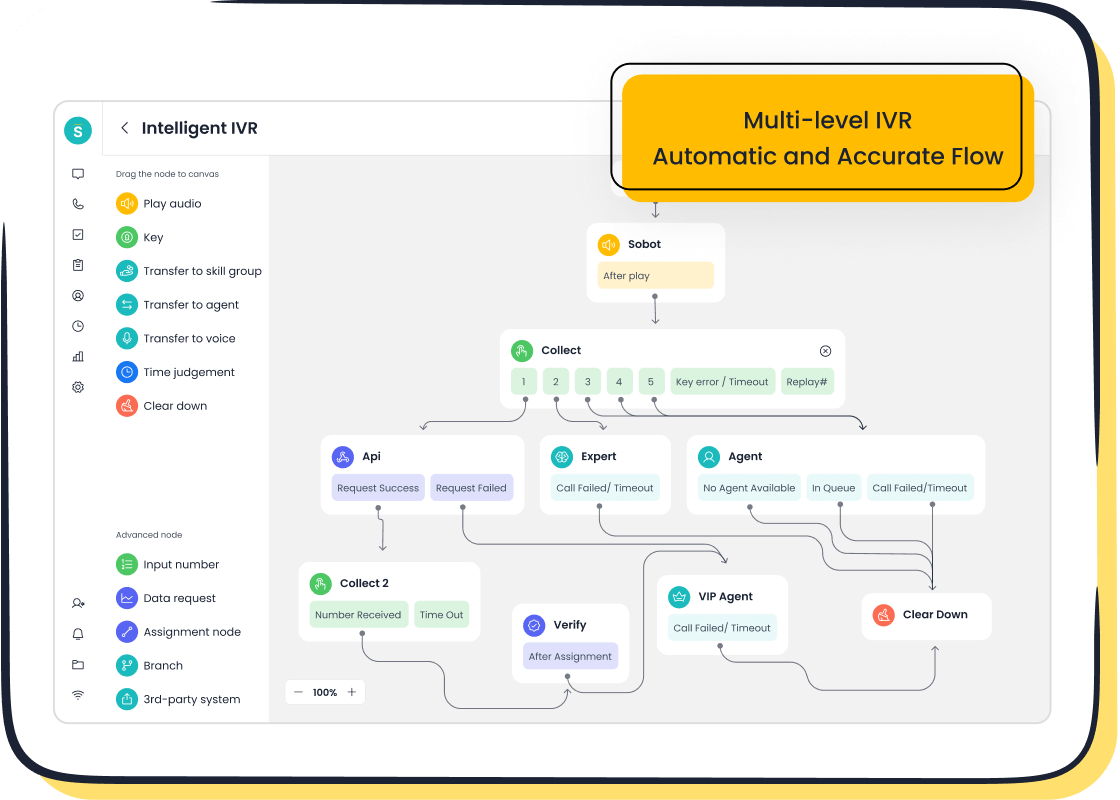
Five9: Features, Strengths, and Use Cases
Five9 stands out as one of the best CCaaS platforms in 2025, offering robust call center software tailored for businesses aiming to enhance customer interactions. Its advanced features, such as generative AI studio and automated workflows, empower organizations to streamline operations and improve efficiency. Five9 integrates seamlessly with CRM systems, enabling agents to access customer data effortlessly.
Key Features
- Global voice capabilities for delivering exceptional customer experiences.
- Comprehensive agent and supervisor desktops for better management.
- APIs and SDKs for customization, ensuring flexibility.
- AI-powered tools for automation and intelligent call routing.
- Automated Call Distribution (ACD) to optimize resource allocation.
Strengths
Five9 excels in outbound calling and video engagement, making it ideal for businesses prioritizing customer outreach. Its global voice capabilities and unified communications integrations ensure consistent service delivery across regions.
Use Cases
Five9 is best suited for AI-ready organizations seeking self-service solutions. For example, a retail company can use Five9’s engagement workflows to automate customer follow-ups, reducing response times and improving satisfaction.
| Feature | Five9 | NICE CXone |
|---|---|---|
| Starting Price | $119/month | $71/user/month |
| Communication Channels | Voice, Email, Chat, SMS, Video | Voice, Email, Chat, SMS, Social Media |
| Key Strength | Outbound Calling, Video Engagement | AI-Driven Analytics, High Customization |
| G2 Rating | 4.1 out of 5 | 4.3 out of 5 |
| Capterra Rating | 4.2 out of 5 | 4.2 out of 5 |
NICE CXone: Features, Strengths, and Use Cases
NICE CXone ranks among the top-rated CCaaS providers, offering innovative call center solutions that combine AI-driven analytics with omnichannel communication. Its software provides a holistic view of customer journeys, enabling businesses to deliver personalized experiences.
Key Features
- Real-time monitoring for immediate adjustments.
- Predictive analytics to forecast call volumes and customer sentiment.
- Customized reporting tailored to specific KPIs.
- Operational insights for resource optimization.
- Automation tools to reduce repetitive tasks and improve efficiency.
Strengths
NICE CXone’s robust analytics capabilities set it apart. It provides actionable insights into customer interactions, helping businesses refine their strategies. Its cost efficiency and high customization make it a preferred choice for organizations aiming to optimize operations.
Use Cases
NICE CXone is ideal for businesses seeking data-driven solutions. For instance, a financial services firm can use its predictive analytics to anticipate customer needs, ensuring proactive support. This approach not only enhances customer satisfaction but also reduces operational costs.
Note: The 'Cloud Based Contact Center Market Size, Share, and Growth Analysis' report highlights NICE CXone’s ability to transform customer experiences through innovative strategies.
Talkdesk: Features, Strengths, and Use Cases
Talkdesk emerges as a leader in call center software, offering solutions designed to improve customer satisfaction and operational efficiency. Its software integrates AI-generated analytics, enabling businesses to gain deeper insights into customer behavior.
Key Features
- Sentiment analysis tools for understanding customer emotions.
- AI-driven analytics for agent training and performance improvement.
- Integration capabilities with existing systems for seamless operations.
- Proactive service enhancements through customer sentiment identification.
Strengths
Talkdesk excels in leveraging AI to enhance customer interactions. Its focus on sentiment analysis and agent training ensures that businesses can address customer needs effectively.
Use Cases
Talkdesk is well-suited for industries like gaming and retail. For example, a gaming company can use its sentiment analysis tools to identify player frustrations and resolve issues proactively, improving customer loyalty.
| Case Study Description | Performance Metrics Observed |
|---|---|
| Integration of sentiment analysis training in call centers | Improved customer satisfaction scores and reduced call handling time |
| Use of AI-generated analytics for agent training | Enhanced efficiency and uplifted team morale |
| Identification of key customer sentiments through AI tools | Better understanding of customer needs and proactive service improvements |
Genesys Cloud CX: Features, Strengths, and Use Cases
Genesys Cloud CX stands out as a leading call center software in 2025, offering a comprehensive suite of tools designed to enhance customer interactions. Its cloud-native architecture ensures scalability and flexibility, making it an ideal choice for businesses of all sizes.
Key Features
- Omnichannel Engagement: Manage customer interactions across voice, chat, email, and social media from a single platform.
- AI-Powered Insights: Leverage AI to analyze customer sentiment and predict behavior, enabling proactive support.
- Workforce Optimization: Tools like predictive scheduling and real-time monitoring improve agent productivity.
- Customizable Dashboards: Tailor dashboards to track key performance indicators (KPIs) and gain actionable insights.
- Seamless Integrations: Connect with CRM systems and other business tools for a unified workflow.
Strengths
Genesys Cloud CX excels in providing a seamless omnichannel experience. Its AI-driven analytics empower businesses to anticipate customer needs and deliver personalized solutions. The platform’s robust integration capabilities ensure smooth operations, even in complex environments.
Use Cases
This software is particularly effective for industries requiring high-touch customer service. For example, a healthcare provider can use Genesys Cloud CX to manage patient inquiries across multiple channels, ensuring timely and accurate responses. Similarly, a retail business can leverage its AI tools to analyze customer feedback and improve service quality.
Tip: Use Genesys Cloud CX’s predictive analytics to forecast customer demand and allocate resources efficiently.
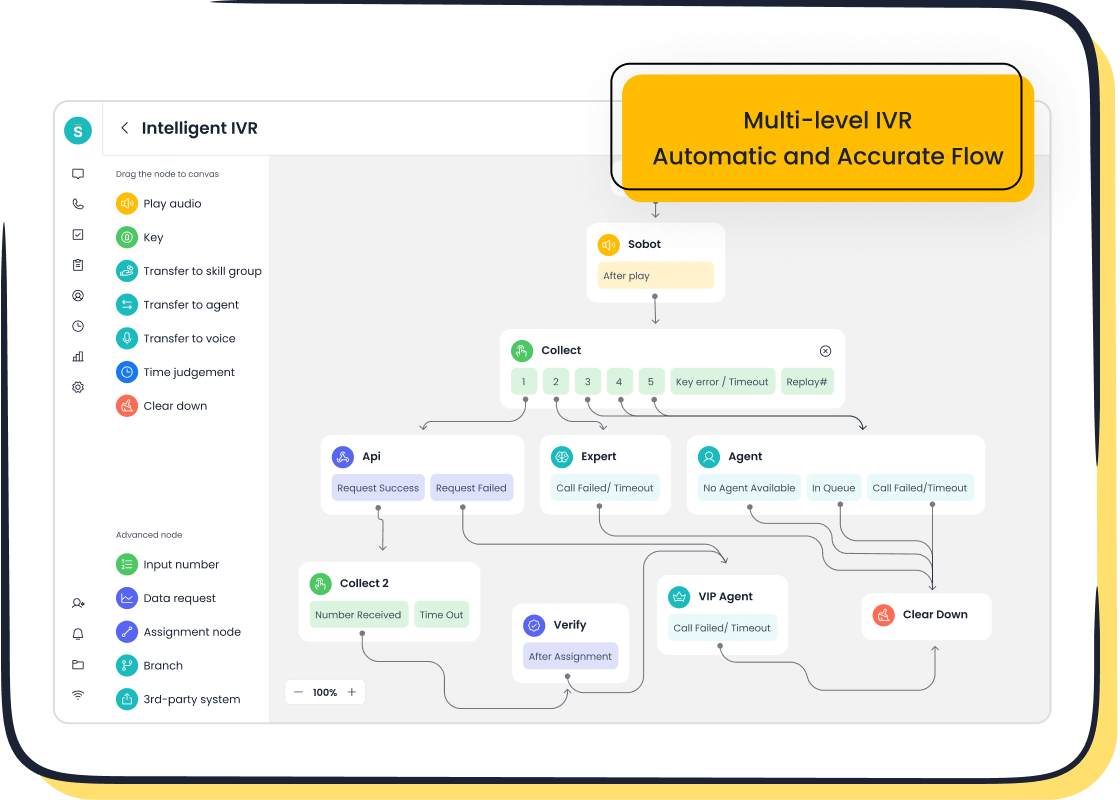
Sobot Voice/Call Center: Features, Strengths, and Use Cases
Sobot Voice/Call Center redefines call center software by offering a stable, AI-powered platform that enhances communication efficiency and customer satisfaction. Designed for businesses of all sizes, it provides a one-stop solution for managing voice interactions globally.
Key Features
- Intelligent IVR: Customize call flows with a drag-and-drop interface, ensuring efficient call routing.
- Unified Workspace: Access customer data and manage calls from a single, AI-enhanced interface.
- AI-Powered Voicebot: Automate routine inquiries with intelligent voice interactions, reducing agent workload.
- Global Number Availability: Obtain phone numbers worldwide to support international operations.
- Real-Time Monitoring: Track call performance and agent activity to ensure high service standards.
Strengths
Sobot Voice/Call Center offers unmatched reliability with a 99.99% system uptime. Its AI-powered tools improve first-contact resolution rates and reduce average handle times. The platform’s seamless integration with CRM systems ensures a unified customer experience.
Use Cases
Sobot Voice/Call Center is ideal for industries like retail, financial services, and gaming. For instance, a retail company can use its bulk outbound task feature to automate promotional calls, increasing customer engagement. A financial services firm can leverage its AI-powered voicebot to handle routine inquiries, freeing agents to focus on complex issues.
| Metric | Result |
|---|---|
| Reduction in inbound discussion volume | 20% |
| Increase in positive feedback | 96% + |
| Correct answers provided by AI platform | Over 80% |
| Customer satisfaction rate | Over 95% |
| Self-service question resolution | 22.2% |
| Customer satisfaction score (CSAT) | 97% |
| Problem resolution rate | 85% |
| Customer happiness rate | 99% |
| Increase in sign-off rate | About 35% |
| Increase in COD collection rate | About 40% |
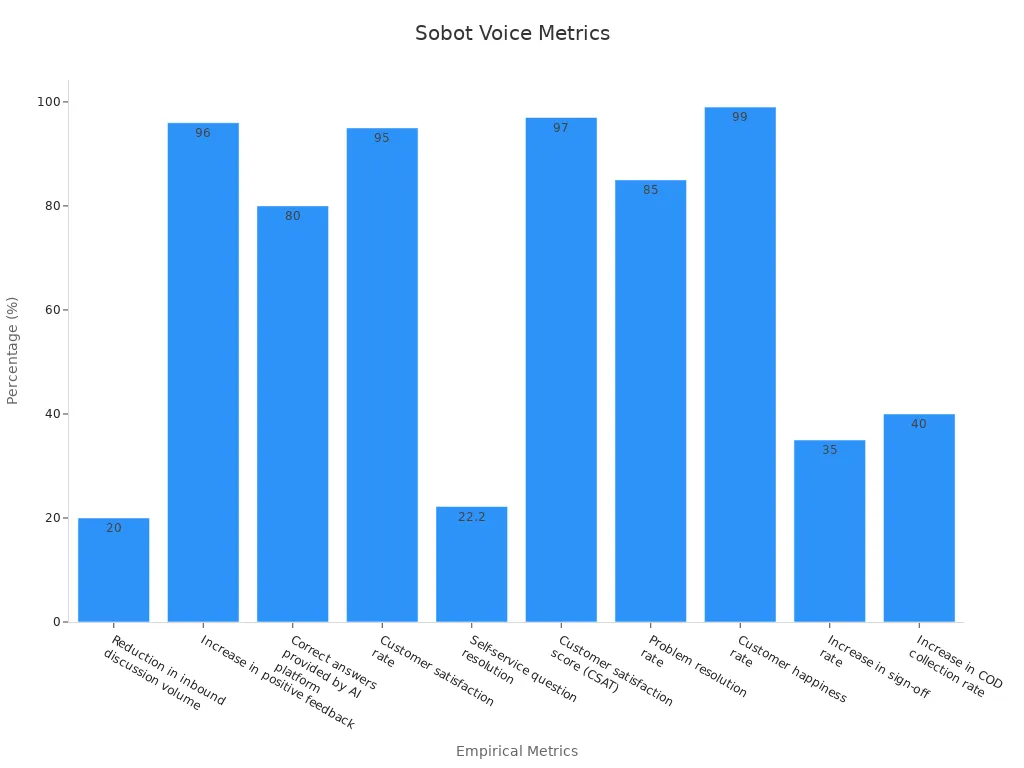
Note: Sobot Voice/Call Center’s AI capabilities ensure over 80% accuracy in responses, significantly improving customer satisfaction and operational efficiency.
Key Features to Look for in Cloud Contact Center Software
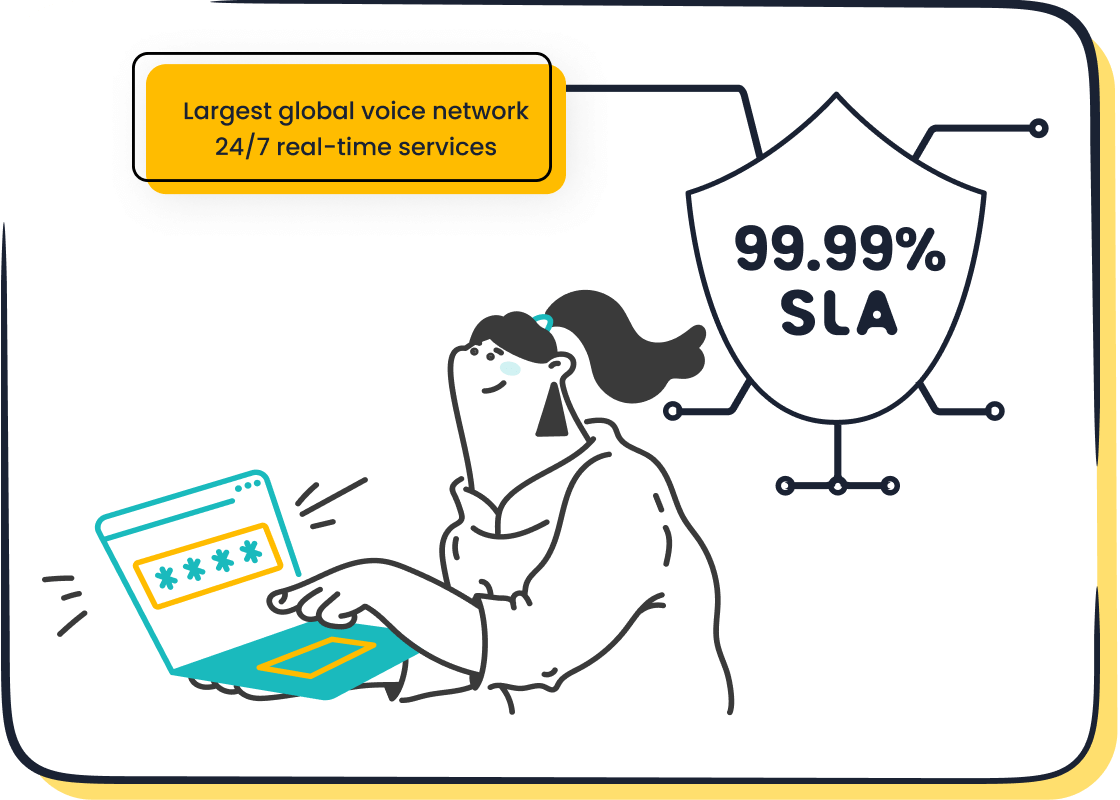
AI-Powered Tools and Automation
AI-powered tools and automation have become indispensable in modern cloud contact center software. These features streamline operations, reduce costs, and improve efficiency. Intelligent virtual agents (IVAs) handle routine inquiries, allowing your agents to focus on more complex tasks. Interactive voice response (IVR) systems provide self-service options, reducing call volumes and enhancing customer satisfaction.
| Statistic Description | Value |
|---|---|
| Cost Reduction | 35% |
| Revenue Increase | 32% |
| Inquiries Handled | 13.8% more per hour |
| Time Saved on Calls | 45% |
| Issue Resolution Speed | 44% faster |
| Quality Improvement | 35% increase in quality and consistency |
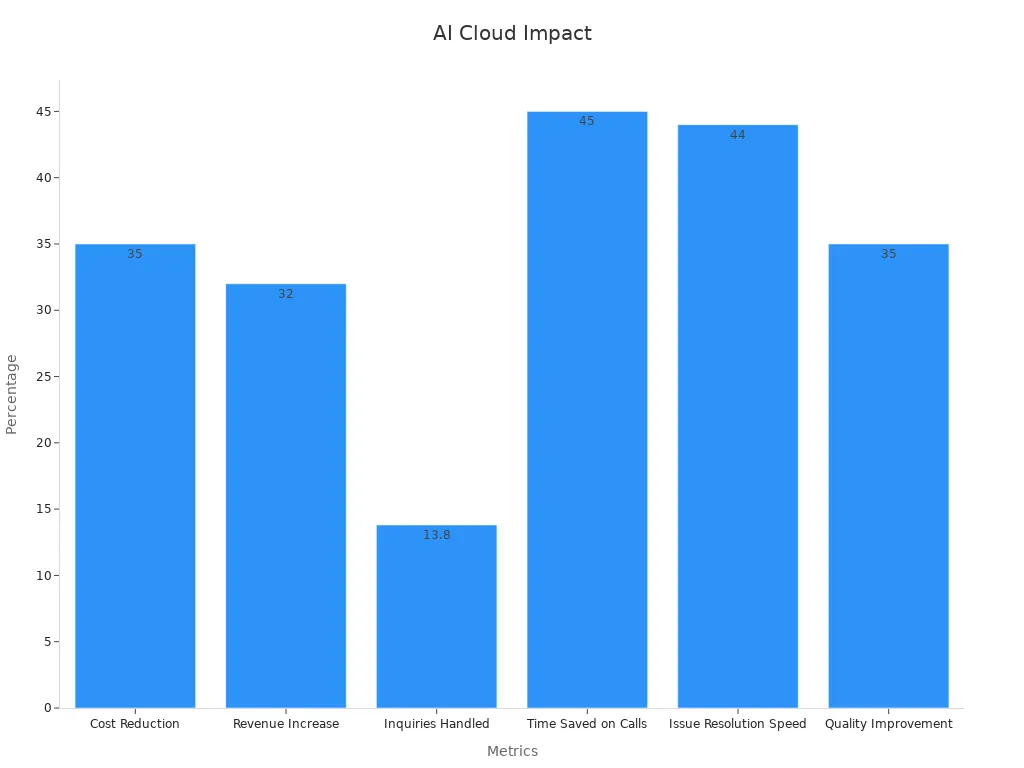
These tools not only enhance productivity but also ensure consistent service quality. By leveraging AI, you can transform your contact center into a hub of innovation and efficiency.
CRM Integration and Omnichannel Support
CRM integration and omnichannel support are critical call center features that ensure seamless customer interactions. With CRM integration, your agents can access customer information and past interactions from a single platform, improving efficiency and coordination. Omnichannel solutions unify communication channels like voice, email, chat, and social media, providing a consistent experience across all touchpoints.
- Enhances customer experience by connecting all interaction channels seamlessly.
- Reduces time spent switching between systems, enabling agents to handle more queries efficiently.
- Real-time analytics offer insights into customer interactions, helping you optimize strategies.
Shared access to customer data between sales and support teams fosters collaboration and operational smoothness. This integration ensures your business delivers personalized and efficient service, boosting customer satisfaction.
Advanced Analytics and Reporting
Advanced analytics and reporting are essential for tracking performance and improving operations. Metrics like First-Call Resolution (FCR), Customer Satisfaction Score (CSAT), and Average Handle Time (AHT) provide valuable insights into your contact center's efficiency.
| Metric | Description |
|---|---|
| First-Call Resolution (FCR) | Measures the percentage of calls resolved on the first interaction. |
| Customer Satisfaction Score (CSAT) | Quantifies customer satisfaction with the service received. |
| Average Handle Time (AHT) | Indicates the average duration taken to resolve a customer call. |
Predictive analytics further enhance operations by anticipating customer needs and streamlining workflows during peak times. Machine learning algorithms identify potential issues before they escalate, ensuring proactive service. By leveraging these tools, you can optimize resource allocation and deliver superior customer experiences.
Security and Compliance
In 2025, security and compliance remain critical for cloud contact centers. As businesses increasingly rely on cloud infrastructure, ensuring data protection and regulatory adherence becomes essential. A secure platform safeguards sensitive customer information, prevents breaches, and builds trust. Compliance with industry standards also ensures your operations align with legal requirements, reducing risks and penalties.
The Growing Need for Security Measures
Cloud contact centers face unique challenges in maintaining security. Misconfigurations, human errors, and lack of visibility contribute to vulnerabilities. These issues highlight the importance of robust security protocols. Consider the following statistics:
| Statistic | Percentage |
|---|---|
| Cloud security incidents due to misconfiguration | 23% |
| Businesses encountering security breaches in public cloud infrastructure | 27% |
| Cloud security breaches attributed to lack of visibility | 82% |
| Companies experiencing a cloud security breach in the last 18 months | 83% |
| Organizations that experienced a cloud security breach in the last year | 80% |
| Breaches caused by human error | 82% |
| Organizations fearing undetected cloud data breaches | 25% |
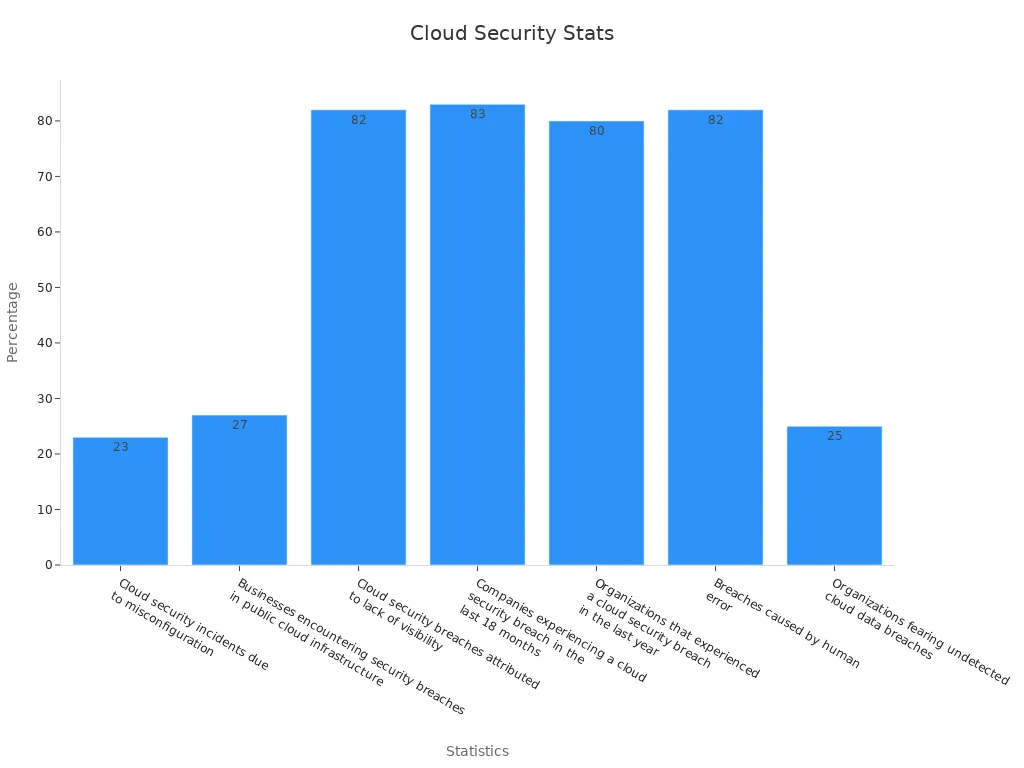
These figures emphasize the need for proactive measures to protect your cloud contact center from potential threats.
Best Practices for Security and Compliance
To ensure your cloud contact center remains secure, adopt industry-standard practices. Regular penetration tests and security audits help identify vulnerabilities before they escalate. Platforms like Google Cloud adhere to compliance certifications, providing a reliable foundation for your operations. By implementing encryption protocols and multi-factor authentication, you can safeguard customer data and prevent unauthorized access.
Omnichannel solutions further enhance security by centralizing communication channels. This unified approach reduces the risk of data fragmentation and ensures consistent monitoring across platforms. With omnichannel integration, you can streamline operations while maintaining high security standards.
Building Trust Through Compliance
Compliance with regulations such as GDPR and CCPA demonstrates your commitment to protecting customer privacy. It also ensures your business avoids legal repercussions. By aligning your cloud contact center with these standards, you foster trust and loyalty among customers. A secure and compliant platform not only protects your data but also strengthens your brand reputation.
Tip: Partner with vendors who prioritize security and compliance to ensure your cloud contact center meets industry benchmarks.
How to Choose the Right Contact Center as a Service (CCaaS) for Your Business
Selecting the right contact center as a service (CCaaS) platform is a critical decision that can significantly impact your business operations and customer satisfaction. By carefully evaluating your needs, scalability requirements, and financial considerations, you can ensure the solution aligns with your goals and delivers measurable value.
Assessing Business Needs and Goals
Understanding your business objectives is the first step in choosing the right CCaaS platform. Start by identifying the specific challenges your organization faces in customer service. Are you aiming to reduce hold times, improve first-contact resolution, or enhance customer satisfaction? Defining these goals will help you prioritize features and functionalities.
- Reduce Hold Times: Cloud contact center solutions can help you achieve up to a 15% reduction in hold times, ensuring faster service for your customers.
- Adapt to Customer Preferences: With 65% of customers expecting businesses to adapt to their changing needs, selecting a flexible platform becomes essential.
- Boost Repeat Purchases: Good customer service influences 88% of customers to make repeat purchases, highlighting the importance of a reliable CCaaS solution.
Additionally, consider your industry-specific requirements. For instance, a retail business may prioritize omnichannel communication, while a financial services firm might focus on data security and compliance. Tailoring your choice to your unique needs ensures the platform supports your long-term objectives.
Tip: Create a checklist of high-priority requirements to evaluate potential CCaaS providers effectively.
Evaluating Scalability and Customization
Scalability and customization are vital factors when selecting a CCaaS platform. As your business grows, your contact center must adapt to increased customer demands without compromising performance. Cloud contact centers excel in this area, offering unmatched flexibility and rapid deployment.
Key Comparisons Between Traditional and Cloud Contact Centers
| Feature | Traditional Contact Centers | Cloud Contact Centers |
|---|---|---|
| Scalability Process | Separate process required | Few clicks needed |
| Deployment Speed | Slower, manual changes | Rapid deployment |
| Integration Capabilities | Limited | Enhanced integration |
Cloud-based solutions allow you to scale operations with just a few clicks, making them ideal for businesses experiencing rapid growth. They also offer advanced features like AI-powered analytics and global number availability, enabling you to meet the demands of a global customer base.
- Enhanced Scalability: Cloud platforms grow with your business, ensuring you can handle peak traffic without disruptions.
- Customization Options: Tailor the platform to your specific needs, from call routing workflows to personalized customer interactions.
- Operational Efficiency: Advanced features streamline processes, reducing costs and improving service quality.
By choosing a CCaaS provider that offers both scalability and customization, you can future-proof your contact center and maintain high service standards.
Note: Evaluate the provider’s technology roadmap to ensure they stay updated with the latest innovations.
Comparing Costs and ROI
Cost considerations play a significant role in selecting a CCaaS platform. While cloud contact centers often have lower upfront costs compared to traditional systems, it’s essential to analyze the total cost of ownership and potential return on investment (ROI).
Breakdown of Costs
| Costs | Description | Details |
|---|---|---|
| Implementation and Integration | Cost related to setting up the platform and integrating it with existing systems. | * Setup fees * Hardware (if required) * Software licenses * CRM integration |
| Training and Onboarding | Expenses for training agents, supervisors, and IT staff. | * In-person training * Online courses and materials |
| Migration | Costs for transferring data from legacy systems. | * Data extraction, transformation, and loading |
| Subscription Fees | Recurring costs for using the platform, typically charged per agent or minute. | * User licenses * API calls * Messages |
| Scalability | Additional expenses for scaling up operations. | * Adding seats |
While these costs may seem significant, the financial benefits often outweigh the expenses. For example, an independent study by Forrester found that enterprises deploying Five9 Intelligent Cloud Contact Center achieved a 213% ROI. Over three years, businesses experienced benefits of $27.58 million against costs of $8.81 million, resulting in a net present value of $18.77 million.
Tip: Compare subscription fees and scalability costs across providers to find the most cost-effective solution.
By conducting a thorough cost-benefit analysis, you can select a CCaaS platform that delivers maximum value for your investment.
Industry-Specific Requirements
Every industry has unique customer service needs. When choosing a cloud contact center solution, you must evaluate how well the platform aligns with your sector's requirements. Different industries prioritize specific features based on their operational challenges and customer expectations.
Retail and E-Commerce
Retail businesses often deal with high volumes of customer inquiries across multiple channels. A cloud contact center with omnichannel capabilities ensures seamless communication through voice, email, chat, and social media. Features like AI-driven chatbots and real-time analytics help you manage peak shopping seasons efficiently.
Tip: Use predictive analytics to forecast demand during holidays and optimize staffing levels.
Financial Services
Financial institutions require robust security and compliance features to protect sensitive customer data. A platform offering encrypted data transfer, multi-factor authentication, and adherence to regulations like GDPR and CCPA is essential. Integration with CRM systems ensures agents have access to detailed customer histories, enabling personalized service.
Gaming and Entertainment
Gaming companies need solutions that can handle complex technical inquiries. Sentiment analysis tools help you identify player frustrations and address issues proactively. AI-powered voicebots reduce response times, ensuring players receive quick resolutions.
Education
Educational organizations benefit from unified workspaces that consolidate student interactions across channels. Features like automated workflows and AI-driven insights streamline administrative tasks, allowing staff to focus on providing quality support.
Enterprise Services
Large enterprises require scalable solutions to manage global operations. Platforms offering international number availability and time zone support ensure consistent service delivery across regions. Intelligent IVR systems enhance call routing, reducing wait times and improving customer satisfaction.
Vendor Support and Training
Selecting a cloud contact center provider involves more than evaluating features. Vendor support and training play a crucial role in ensuring the platform's success. Reliable support services and comprehensive training programs empower your team to maximize the solution's potential.
Key Considerations for Vendor Support
- Customer support and service level agreements (SLAs) define the quality of assistance you can expect.
- SLAs should outline response times, performance benchmarks, and escalation protocols.
- Feedback from existing customers helps you assess the provider's reliability and user satisfaction.
Importance of Training Programs
Effective training ensures your agents and administrators can use the platform efficiently. Look for providers offering:
- Onboarding Sessions: Step-by-step guidance for new users.
- Ongoing Training: Regular updates on new features and best practices.
- Self-Service Resources: Access to FAQs, tutorials, and knowledge bases.
Note: Comprehensive training reduces downtime during implementation and boosts agent productivity.
Evaluating Vendor Support and Training
When comparing providers, consider the following:
| Criteria | Description |
|---|---|
| Response Times | How quickly the vendor addresses support requests. |
| Availability | Whether support is offered 24/7 or during specific hours. |
| Training Formats | Options like in-person sessions, webinars, or online courses. |
| Customer Feedback | Insights from existing users about the vendor's reliability and support quality. |
By prioritizing vendors with strong support and training programs, you ensure a smooth transition to the cloud and long-term success for your contact center operations.
Cloud contact centers redefine customer service in 2025 by integrating AI and omnichannel communication. These platforms enhance efficiency, reduce costs, and improve customer satisfaction, making them indispensable for businesses aiming to stay competitive.
| Advantage | Description |
|---|---|
| Scalability | Easily adapt to changing business demands. |
| Cost Efficiency | Lower setup and maintenance costs compared to traditional systems. |
| Improved Customer Experience | Omnichannel support ensures seamless interactions. |
| Enhanced Security | Protect sensitive customer data with advanced measures. |
Solutions like Five9, NICE CXone, Talkdesk, Genesys Cloud CX, and Sobot Voice/Call Center offer unique features tailored to diverse industries. Evaluate your business needs, scalability requirements, and ROI to select the best fit. By choosing wisely, you position your contact center to deliver exceptional experiences and drive growth.
FAQ
What is a cloud contact center?
A cloud contact center is a customer service platform hosted on the cloud. It enables you to manage interactions across multiple channels like voice, email, chat, and social media. This solution eliminates the need for on-premises infrastructure, offering scalability, flexibility, and cost efficiency.
How does AI improve cloud contact centers?
AI automates repetitive tasks, analyzes customer data, and provides actionable insights. Tools like chatbots and sentiment analysis enhance customer interactions. Predictive analytics helps you allocate resources effectively, while AI-powered voicebots reduce agent workload, ensuring faster resolutions and improved customer satisfaction.
What industries benefit most from cloud contact centers?
Industries like retail, financial services, gaming, education, and enterprise services gain the most. These sectors require omnichannel communication, data security, and scalability. Cloud contact centers help you streamline operations, personalize customer interactions, and meet industry-specific needs efficiently.
How do cloud contact centers ensure data security?
Cloud contact centers use encryption, multi-factor authentication, and compliance with regulations like GDPR and CCPA. Regular security audits and real-time monitoring protect sensitive customer data. These measures build trust and ensure your operations remain secure and compliant.
Can small businesses use cloud contact centers?
Yes, small businesses can benefit significantly. Cloud contact centers offer affordable subscription models, scalability, and easy integration with existing systems. Features like AI-driven automation and omnichannel support help you deliver professional customer service without requiring extensive resources.
Tip: Start with a scalable solution to grow your contact center as your business expands.
See Also
Best Cloud Contact Center Solutions To Explore In 2024
Leading Reviews Of Cloud Contact Center Services For 2024
Comprehensive Reviews Of Contact Center Solutions For 2024
